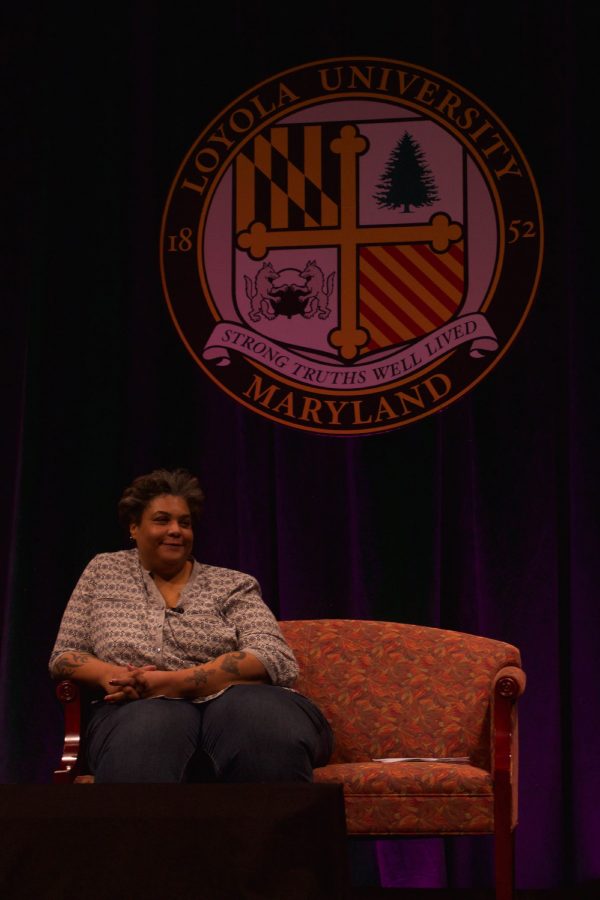Loyola celebrated its 26th annual Martin Luther King Jr. Convocation with the welcoming of writer, editor, professor, and public speaker Roxane Gay to campus on Tuesday, Jan. 23. Gay, a New York Times best-selling author of works including “Bad Feminist,” “Hunger,” and “Difficult Women,” took the stage at Reitz Arena to not only analyze the current state of America but also to answer the questions of students, faculty, and fans alike.
The Loyola community, in addition to the Jesuit and Baltimore communities at large, was brought together at a reception prior to the convocation. Regardless of the tie they had to Gay and her work, a majority of the room expressed their support in very similar ways.
“Bad Feminist,” Gay’s account of juggling feminism with interests and ideas that seem to juxtapose the values of being one, deeply resonated with many of her fans, including Marie Anderson ‘11, assistant director for Loyola’s York Road Initiative.
“It was this weird book called ‘Bad Feminist,’” said Anderson, laughing as she recounted her first encounter with Gay’s work. “I love that it’s not just talking about feminism. It’s talking about body positivity, it’s talking about being who you are, and I just really jived with it, and I appreciated her words and her bravery to speak them.”
Many of Gay’s supporters cite their appreciation for her writing in its ability to connect with the reader both professionally and personally. Terrence Cavanagh, the executive director of the SEIU Maryland/DC state council and a member of the Saint Ignatius Justice and Peace Committee said, “It [The MLK Convocation] has always been a great event, and I’ve learned something each year.” As a committee member, Cavanagh has attended the MLK Convocation for the past five years. “Roxane Gay is a hero to my daughters, and I wanted to find out more about why. Both of them have read ‘Bad Feminist,’ and I think I’m going to get her other book today,” he said.
In addition to her gained credibility through notable work like “Bad Feminist,” many rely on Gay and her prolific opinions on American current events. Melody Gordon-Healy, a former textile arts professor at Loyola and a member of the Loyola community for 30 years, was eager to hear “what her take on the Washington incident on Friday was,” referencing the alleged harassment of a Native American man by students from Covington Catholic High School on Jan. 18. Unbeknownst to Gay, she opened her lecture with answers to Gordon-Healy’s inquiries.
“Instead of appropriately condemning these boys–who have been defended by the president and are scheduled to meet with him–instead of having a conversation about how their behavior might be addressed, instead of talking about toxic masculinity and privilege, too many people are defending the humanity of these good white boys as if holding them accountable for bad behavior somehow denies that humanity,” said Gay.
In addition to addressing the reprehensible behavior displayed by the Covington students, Gay also addressed the Trump presidency and administration. However, she’s “not really interested in relitigating the election. Instead, [she’s] interested in figuring out where we go from here. [She’s] interested in figuring out how we survive this age of American disgrace.” Throughout both her lecture and Q&A session, Gay explored and emphasized the importance of civic participation as the country approaches its next presidential election.
Appropriately touched upon in terms of both the alleged harassment by the Covington students and the current political state of America, Gay also analyzed the First Amendment of the Constitution and society’s misinterpretations of it. The First Amendment “does not guarantee a freedom from consequence. You can speak your mind, but you can also be shunned for it,” Gay said. “It’s a right, but it is also a responsibility and one that far too many people ignore.”
Aside from social commentary, many audience members were eager to learn more about Gay’s writing process. “I have somehow managed to make a career for myself out of being terrified, but doing it anyway,” Gay said in response to questions about making her vulnerability something beautiful yet also lucrative. “It’s important to just know that you’re afraid and acknowledge the fear and write anyway. Because if you wait for the courage to say terrifying things, it’s probably never going to come.”
Many fans admire Gay for her courage to speak about and publish the difficult parts of her present and past. “We speak so much about vulnerability here at Loyola, and the power of being vulnerable. I think she truly embodies that, and I admire her willingness to lend herself so fully to her art and share it, because I imagine that’d be so difficult,” said Rachael Martines ‘18, a current Loyola graduate student in the School of Education and the chair of the Hunger and Poverty Committee at Saint Ignatius Parish.
Above all, the widening of the scope of people who hear Gay’s words is the part of her career that she values most. Explaining the basis of why she pursued her career as a writer, Gay said, “The work I do isn’t for me. Not really. It’s for the people who don’t hold the privileges that I do, who need someone to stand and speak and fight for them—with them. This is how I use my freedom to speak. This is how I create safe spaces whenever I can.”
Featured Image Courtesy of Alex Vigliotti



















































































































Anonymous • Jan 26, 2019 at 9:15 am
5